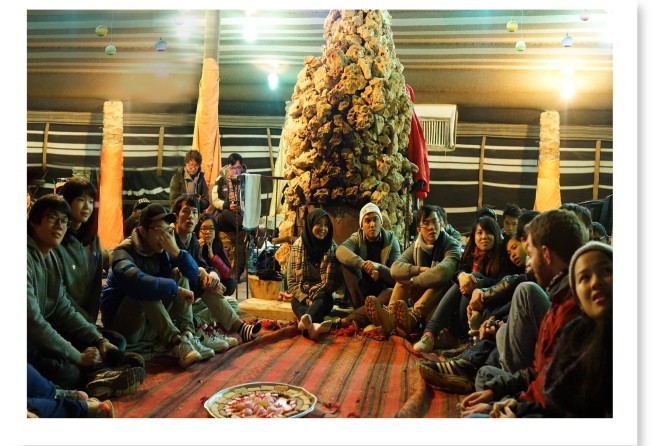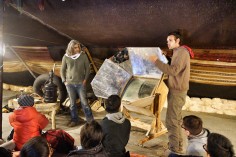Israeli start-ups teach Hong Kong's would-be entrepreneurs a thing or two

Even with only eight million people in an area that's two-thirds the size of Taiwan, Israel has 3,800 start-ups - that's one for every 2,000 people.
In fact, Israel has more companies listed on Nasdaq than all of Europe. With many hugely successful technology companies in the country, it's been dubbed "the start-up nation" by tech pundits.
Fifty university and secondary students from Hong Kong got the chance to see firsthand the secrets to Israeli entrepreneurial success in January, thanks to a six-day trip co-organised by the Technion (Israel Institute of Technology) and Li Ka Shing Foundation.
Leading the trip - dubbed the Techcracker Lab - was Solina Chau Hoi-shuen, director of the Li Ka Shing Foundation and founder of Horizons Ventures, which has invested in 27 Israeli start-ups.
Chau says creativity is a way of life in Israel - something she noticed in the past two years during regular visits.
"Every time I talk with start-ups there, I learn a lot. When they make their pitches, each company only gets eight to 10 minutes, so they need to give me the essence [of their invention and development plan] to arouse my interest," Chau says, adding that Israelis tend to be more open to constructive criticism and challenges than Chinese. "They'll say, 'I can't address your queries today, but I will improve my pitch and get back to you.'"
The six-day trip involved talks with Israeli start-up founders who has received funding from Li. Among the group was Uri Levine, co-founder of Waze, a community-based traffic and navigation app that Google bought for US$1.1 billion.
On their first night in Israel, students were put up in tents in a desert in Kfar Hanokdim, located between the city of Arad and the ancient mountain fortress of Masada. The region's native Bedouin tribe showed students their customs while tent dwellers demonstrated how to construct solar panels to get energy.
Also included on the itinerary was a visit to Caliber 3 on the West Bank, a counter-terror and security academy specialising training Swat teams. Students got the opportunity to participate in shooting practice and close-combat training sessions.
A third-year electronic engineering student at Technion, Malkiel Malayev, told students how compulsory military service changed him.
"Aside from being combat soldiers or pilots, you get different types of jobs in the Israeli defence force like engineers, technicians and medics," says Malayev, 26.
"Doing military service gave me opportunities to develop better qualities like discipline, resilience and the mentality to serve the society."
He says the experience helped him start his own tech company.
"Although I stopped it half a year later to concentrate on school, it was a valuable experience."
Saul Singer, co-author of Start-Up Nation, the Story of Israel's Economic Miracle, agrees that military service is important to their innovation story.
"The Israeli military is not hierarchical; recruits often challenge their superiors and call generals by their nicknames. We are also exposed to cutting-edge technology," says Singer.
He says the military also teaches valuable life skills such as strategic thinking and teamwork. "They teach that the mission is something important and difficult to accomplish. To succeed, you have to improvise and take risks. All these are 21st century skills that businesses are looking for when they are hiring people. And Israelis learn these not at school but in the military."
However, Israel's schools deserve credit, too.
"Our education system encourages people to question and argue. Lots of students are already thinking what start-up they want to do when they are studying."
Szeto Ho-lun, a Form Six student from Carmel Pak U Secondary School in Tai Po, met several founders on the trip, and came away impressed by the entrepreneurial spirit.
"Israel is a country that is surrounded by rival Middle Eastern countries, but even with the constant stress, they still innovate," says Szeto. "In comparison, Hong Kong students grow up in comfortable and affluent surroundings, but they lack creativity. Students just want to be doctors or lawyers. They don't get the idea of being an entrepreneur and inventing products to serve the society."
Avi Hasson, chief scientist of the Ministry of Economy of Israel, attributes the country's problem-solving attitude to necessity.
"We have no natural resources. Ours is the only [piece of] land in the Middle East without oil. There's also no water in this country, so we developed advanced water technology," he says.
"The largest desalination plant in the world is in Israel. We recycle and reuse 80 per cent of our water. We don't have a large market like China. There's no Europe in our backyard for potential market. So Israeli entrepreneurs understand from day one that they need to build global companies."
Israel's tech industry accounts for half of the country's industrial exports, with 10 per cent of its employees working for the sector. A total of 275 multinationals have research and development centres in Israel, including Google.
The foundation also sees the potential of Israeli technological prowess.
Of the 50 plus start-ups that Horizons Ventures has invested in, 27 come from Israel. Hasson says this stems partly from effective public and private partnership.
"The public and private sector work together. The government [provides] infrastructure, like the technology research centres we help create in universities. We also provide a favourable tax environment, intellectual property regime to create an environment that is attractive to researchers and entrepreneurs," Hassan says.
But with these efforts come risks. "Innovation and research and development are very risky. Most of these ventures fail. Sometimes the technology is great, but fails at the commercial level. As government, we see different risks and returns than the private sector. As a venture capitalist, I'm not happy as I lost money."
Hong Kong is trying to boost the local start-up scene with funds - Chief Executive Leung Chung-ying announced last month an injection of HK$5 billion into the Innovation and Technology Fund - but experts are sceptical.

"A start-up is an organic and bottom-up process," says Singer. "Start-ups don't like to be in a tech park. They like to be in the neighbourhoods where there's most energy and [they feel they are] in the centre of things."
Singer suggests Hong Kong pays attention to where the start-ups are forming and focus on bringing attention to them instead.
"Look at what London did. Start-ups came up between the town centre and the Olympic park. That's not a very nice part of town, but they decided to call that area a tech city and brought attention to it."